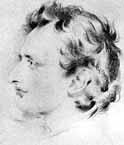
The Pub in Literature: England's Altered State
 |
Benjamin Haydon
'An Immortal Evening' (1817)
|
Introduction Whilst the lower classes were bound to take their drinking pleasures in public, and were berated for their drunkenness, the middling and upper classes could discreetly hide their misbehaviour in private parties. The following, from Benjamin Haydon's Autobiography, suggests how the Romantics - Keats, Wordsworth, Lamb - enjoyed themselves behind closed doors, presided over by their literary heroes.
On December 28th the immortal dinner came off in my painting-room, with Jerusalem towering up behind us as a a background. Wordsworth was in fine cue, and we had a glorious set-to--on Homer, Shakespeare, Milton and Virgil. Lamb got exceedingly merry and exquisitely witty; and his fun in the midst of Wordsorth's solemn intonations of oratory was like the sarcasm and wit of the fool in the intervals of Lear's passion. He made a speech and voted me absent, and made them drink my health. "Now," said Lamb, " you old lake poet, you rascally poet, why do you call Voitaire dull? " We all defended Wordsworth, and affirmed there was a state of mind when Voitaire would be dull. "Well," said Lamb, " here's Voitaire--the Messiah of the French nation, and a very proper one too." He then, in a strain of humour beyond description, abused me for putting Newton's head into my picture; " a fellow," said he, "who believed nothing unless it was as clear as the three sides of a triangle." And then he and Keats agreed he had destroyed all the poetry of the rainbow by reducing it to the prismatic colours. It was impossible to resist him, and we all drank "Newton's health, and confusion to mathematics." It was delightful to see the good humour of Wordsworth in giving in to all our frolics without affectation and laughing as heartily as the best of us. By this time other friends joined, amongst them poor Ritchic who was going to penetrate by Fezzan to Timbuctoo. I introduced him to all as "a gentleman going to Africa." Lamb seemed to take no notice; but all of a sudden he roared out: "Which is the gentleman we are going to lose?" We then drank the victim's health, in which Ritchie joined. In the morning of this delightful day, a gentleman, a perfect stranger, had called on me. He said he knew my friends, had an enthusiasm for Wordsworth, and begged I would procure him the happiness of an introduction. He told me he was a comptroller of stamps, and often had correspondence with the poet. I thought it a liberty; but still, as he seemed a gentleman, I told him he might come. When we retired to tea we found the comptroller. In introducing him to Wordsworth I forgot to say who he was. After a little time the comptroller looked down, looked up and said to Wordsworth: "Don't you think, sir, Milton was a great genius?" Keats looked at me, Wordsworth looked at the comptroller. Lamb who was dozing by the fire turned round and said: "Pray, sir, did you say Milton was a great genius?" "No, sir; I asked Mr Wordsworth if he were not." "Oh," said Lamb, " then you are a silly fellow." " Charles! my dear Charles! " said Wordsworth; but Lamb, perfectly innocent of the confusion he had created, was off again by the fire. After an awful pause the comptroller said: "Don't you think Newton a great genius?" I could not stand it any longer. Keats put his head into my books. Ritchie squeezed in a laugh. Wordsworth seemed asking himself: " Who is this? " Lamb got up' and taking a candle, said: "Sir, will you allow me to look at your phrenological development?" He then turned his back on the poor man, and at every question of the comptroller he chaunted:
The man in office, finding Wordsworth did not know who he was, said in a spasmodic and half-chuckling anticipation of assured victory: "I have had the honour of some correspondence with you,MrWordsworth." "With me,sir?"said Wordsworth, "not that I remember." "Don't you,sir? l am a comptroller of stamps." There was a dead silence, the comptroller evidently thinking that was enough. While we were waiting for Wordsworth's reply, Lamb sung out:
"My dear Charles !" said Wordsworth.
chaunted Lamb, and then rising, exclaimed: "Do let me have another look at that gentleman's organs." Keats and I hurried Lamb into the painting-room, shut the door and gave way to inextinguishable laughter. Monkhouse followed and tried to get Lamb away. We went back, but the comptroller was irreconcilable. We soothed and smiled and asked him to supper. He stayed though his dignity was sorely affected. However, being a good-natured man, we parted all in good humour, and no ill effects followed. All the while, until Monkhouse succeeded, we could hear Lamb struggling in the painting-room and calling at intervals: "Who is that fellow? Allow me to see his organs once more." It was indeed an immortal evening. Wordsworth's fine intonation as he quoted Milton and Virgil, Keats' eager inspired look, Lamb's quaint sparkle of lambent humour, so speeded the stream of conversation, that in my life I never passed a more delightful time. All our fun was within bounds. Not a word passed that an apostle might not have listened to. It was a night worthy of the Elizabethan age, and my solemn Jerusalem flashing up by the flame of the fire, with Christ hanging over us like a vision, all made up a picture which will long glow upon
Keats made Ritchie promise he would carry his Endymion to the great desert of Sahara and fling it in the midst. Poor Ritchie went to Africa, and died, as Lamb foresaw, in 1819. Keats died in 1821, at Rome. C. Lamb is gone, joking to the last. Monkhouse is dead, and Wordsworth and I are the only two now living (1841) of that glorious party. |